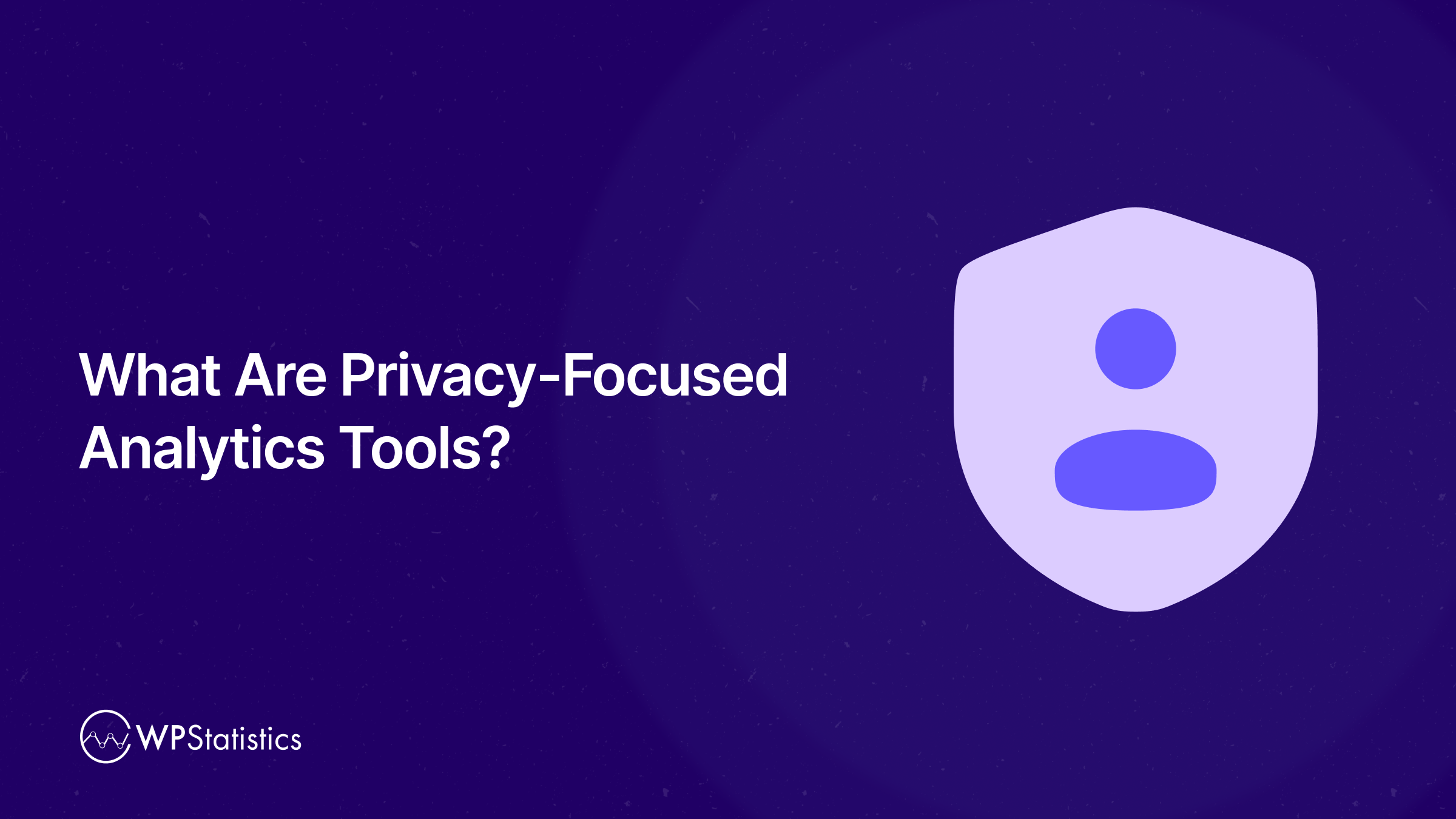Why do you need to go for privacy-focused analytics tools?
Web analytics is a crucial component of running a website, whether you have an online store or a blog.
Almost 15 million websites are using GA4. The thing is that it’s an intrusive tracking platform that has raised concerns about users’ privacy.
That’s why more and more website owners are turning to privacy-focused analytics tools to protect visitors’ personal data.
If you’re one of those businesses that actually care about data privacy, you need to know what these tools are and how you can use them.
What Are Privacy-Focused Analytics Tools?
As the name suggests, privacy-focused analytics tools are designed with visitors’ privacy as a priority.
Let’s explain this with an example:
When you Google something like “running shoes,” you might later see similar ads about running shoes on totally different websites, like a news site or a blog.
If you want to know why, you’ve come to the right place. Traditional analytics tools like GA4 or Facebook Pixel track users across the web using cookies, IP addresses, browser fingerprints, and other technologies.
They use this method for retargeting, remarketing, and selling users’ data to third-party tools.
This has raised concerns about the privacy of internet users, and that’s where privacy-first web analytics tools come in.
Differences between Traditional vs. Privacy-First Web Analytics
Privacy-focused tools might have different levels of privacy and various features and limitations.
However, they usually share important aspects that make them different from traditional web analytics tools.
The following table lists the main differences between traditional tools like Google Analytics and privacy-focused platforms:
| Traditional Analytics | Privacy-First Analytics |
|---|---|
| Heavy script | Lightweight |
| Uses cookies | Cookie-free unless the user wants |
| Tracking personal data like IP | Anonymized, essential data tracking |
| Ad network tracking for advertising | No ad tracking features |
| Requires consent banners | Usually, no banners are needed |
| Data shared with Big Tech | Self-hosted or trusted hosts like WordPress |
| Complex user interface | Simple dashboards for non-technical users |
| Risk of fines for non-compliance | Compliant by default |
| 50-page privacy policy on your site | 1-page simple policy |
Some privacy-focused tools might offer options for enabling cookies or disabling data anonymization. Of course, their default approach is to avoid them unless the user wants.
Why Should You Use Privacy-Focused Analytics Tools?
Here are the benefits of using privacy-first tools instead of Google Analytics:
- Respect Privacy & Build Trust: These tools don’t collect personal data, IPs, or use cookies. So, your visitors feel safe as they stay anonymous and trust your brand.
- GDPR & CCPA Compliant: Privacy-focused tools are already compliant with data protection regulations. So, you don’t need to use cookie banners or complex legal setups.
- Faster Website: When you use lightweight scripts, you’ll have quicker page loads. This is great for SEO and user experience.
- Clean, Simple Data: Privacy-Focused tools are easy-to-use. They usually track only the essentials, like pageviews, traffic sources, and top pages. This is especially great for small businesses.
- Future-Proof: Many browsers are now blocking traditional tools by default, and some users are using ad blockers. Using privacy-focused tools, you’ll remain compliant and updated with the new trend and bypass ad blockers.
What Beginners Get Wrong About Privacy-Focused Analytics
There are common misconceptions about privacy in web analytics tools. Look at the following mistakes to understand them better:
Mistake 1. No Privacy Invasion = No Tracking At All
Many people believe that to track a site’s performance, you must necessarily use invasive methods.
However, privacy-first tools can measure page views, referrers, and popular content and still avoid cookies, IP storage, and cross-site profiling.
In fact, you get the insight to improve your site, and visitors keep their anonymity across the net.
Mistake 2. All Privacy-Focused Tools Are Alike
Many website owners believe all privacy-focused tools offer the same features and have the same level of privacy or compliance. Remember that each tool might be different from others in areas such as:
- Offering options to use cookies
- Data storage location
- Self-hosting availability
- Tracking methods like server-side/client-side
- Data anonymization level
Mistake 3. Inaccuracy of Privacy-Focused Tools
Some website owners think that only GA4 can track web analytics metrics accurately. Although privacy-focused tools are not as famous as GA4, they provide accurate insights into your website performance.
Mistake 4. Difficulty
As GA4 is connected to your Google account, you might think it’s the easiest tool to use for tracking your website. But this is completely wrong. Using GA4 is much more difficult than many privacy-focused tools. They usually offer a simple setup process and don’t have a steep learning curve.
Mistake 5. Using both GA4 and a Privacy-Focused Tool
Many beginners install both GA4 and a privacy-focused analytics tool at the same time. They think it gives them the best of both worlds. But that’s a mistake.
Once you install GA4, it places cookies and collects detailed user data. So, your site is no longer fully privacy-friendly.
In other words, using a privacy-focused tool alongside GA4 won’t make your site GDPR compliant. So, decide what matters most for your site.
If you need detailed marketing and advertising data, GA4 might be a better fit. If you care about privacy, speed, and simplicity, choose a privacy-focused tool.
What Is the Best Privacy-Focused Analytics Software?
Here are the 6 best privacy-focused analytics tools for websites of all sizes and types.
1. WP Statistics
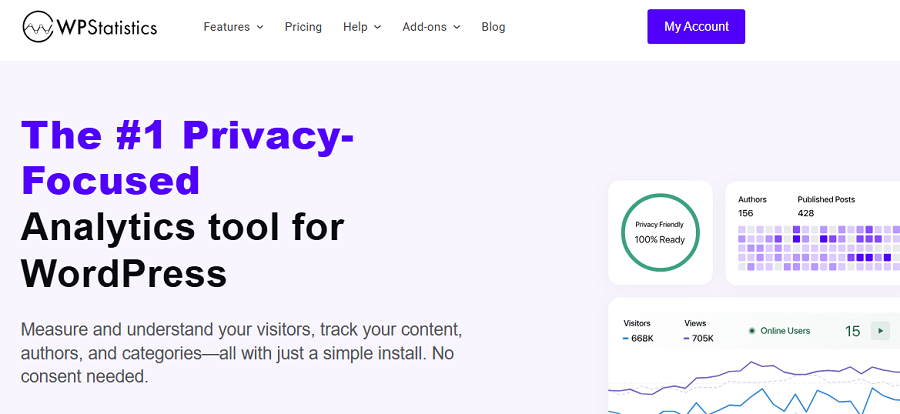
WP Statistics is a great alternative to GA4 and one of the best privacy-focused analytics tools.
By default, it’s fully compliant with data protection regulations like GDPR without having to use consent banners. Also, it gives you the option to enable cookies and integrates well with consent management plugins.
WP Statistics ensures user privacy without sacrificing the accuracy and range of features. The great news is that it offers some capabilities that even Google Analytics does not.
For example, you can track the performance of your website’s authors and compare their performance in terms of the views their posts gain.
Moreover, it integrates well with Google Search Console to let you track top search engine queries and analyze the performance of each URL on your site.
Here are some other key features of WP Statistics:
- Real-time visitor stats
- IP anonymization and user privacy features
- UTM reporting and link builder
- GeoIP and visitor location data
- Tracking campaigns, goals, and events
- Data Plus add-on to track live data
- Tracking clicks and views
| Pros | Cons |
| ✅ No cookies ✅ Real-time stats ✅ Free version with core features ✅ User-friendly ✅ No sharing data | ❌ Only for WordPress websites ❌ Affects performance on high-traffic sites ❌ No built-in multi-site support ❌ Expensive add-ons for small businesses |
2. Plausible Analytics
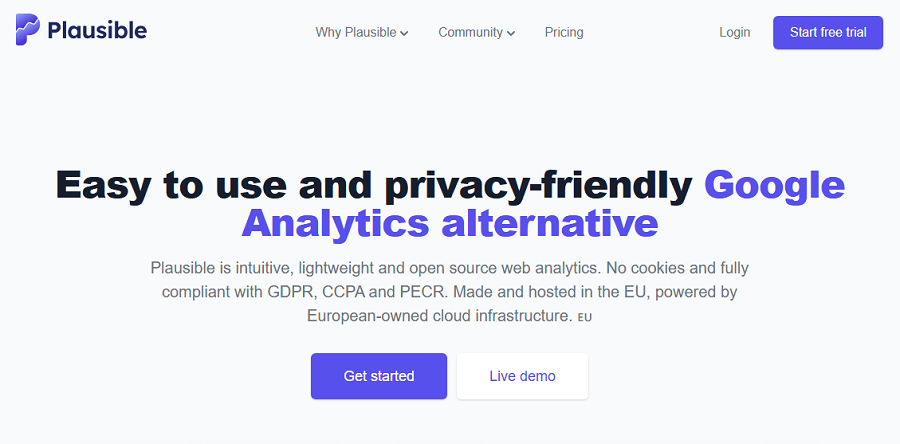
Plausible is another privacy-focused tool that can be used instead of Google Analytics. It’s a lightweight, open-source, privacy-first analytics platform suitable for small businesses that need both simplicity and compliance.
As a result, it’s used by more than 500,000 startups, bloggers, and small businesses across the world.
Here are the top features of Plausible:
- Simple real-time dashboard
- Cookie-free tracking
- UTM parameter support
- Goals and conversion tracking
- Shared dashboards (great for teams)
- Open-source & self-hostable
| Pros | Cons |
| ✅ Lightweight (under 1KB) ✅ GDPR, CCPA, PECR compliant ✅ Open-source & self-hostable ✅ Clean, beginner-friendly UI | ❌ Limited in-depth analysis features ❌ No heatmaps or session recordings ❌ Limited integrations ❌ No ad block bypass |
3. Fathom Analytics
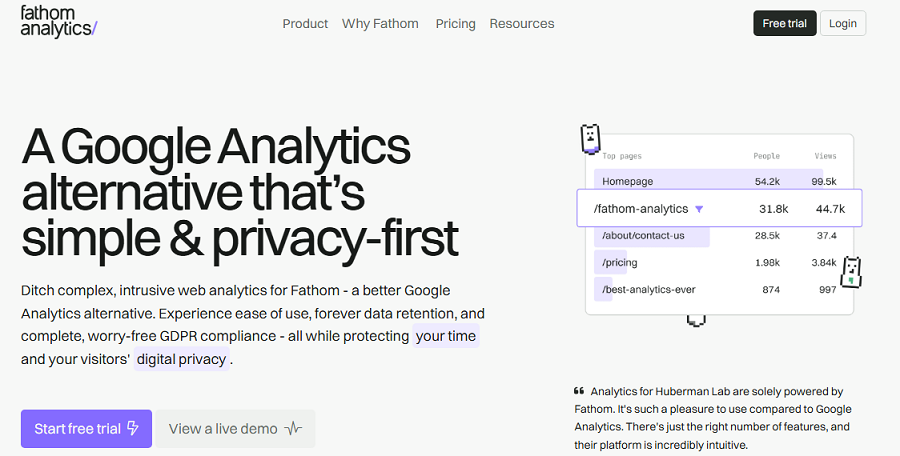
This one is a premium, privacy-focused analytics platform. It’s famous for its clean dashboard and global compliance support, which makes it a reliable alternative to Google Analytics.
It has a strong emphasis on privacy and performance, which is only possible using an enterprise-level infrastructure. That’s why over 200,000 websites across the world use Fathom instead of GA4.
Here are the key features offered by Fathom:
- Cookie-free tracking
- Bypass ad blockers with custom domains
- Email reports
- Real-time traffic data
- GDPR, CCPA, PECR compliant
- Uptime and traffic alerts
| Pros | Cons |
| ✅ Bypasses ad blockers ✅ Reliable infrastructure for high-traffic sites ✅ Clean, professional dashboard | ❌ No free plan available ❌ No advanced segmentation or funnel tracking ❌ Fewer integrations and custom reports ❌ No heatmaps or detailed behavior insights |
4. Simple Analytics
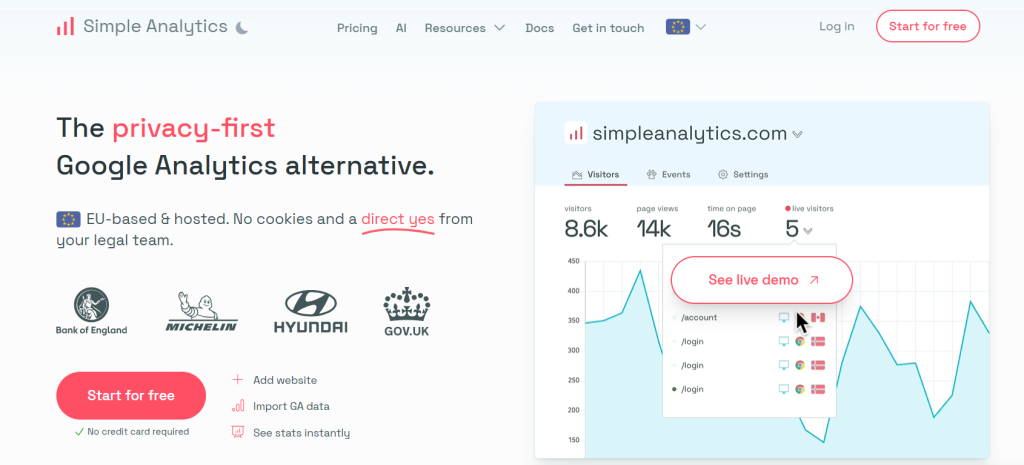
As the name suggests, Simple Analytics is designed to be simple. Using this platform, you can track just the right amount of data, without cookies and behavioral monitoring. This is perfect for marketers, bloggers, and privacy-conscious businesses that just want simple campaign tracking.
Look at the features of Simple Analytics:
- Cookie-free & no personal data collection
- Referral and UTM tracking
- Custom events
- Email reports
- API access for developers
- Hosted in the EU
| Pros | Cons |
| ✅ Focused on clean, essential metrics ✅ UTM and referral tracking support ✅ EU-hosted and GDPR-compliant ✅ Great for bloggers and ethical marketers | ❌ Not open-source ❌ Basic feature set ❌ Limited custom event tracking ❌ Not ideal for complex analytics needs |
5. Umami
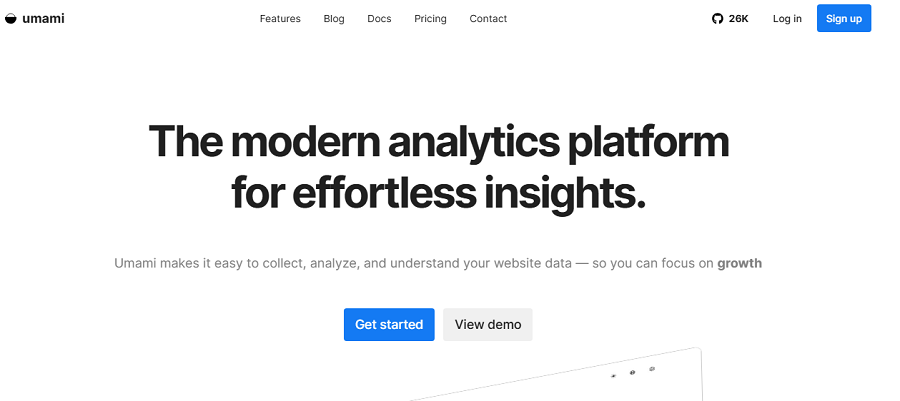
Umami is also a well-known privacy-first analytics tool. It’s a free, open-source tool built for developers and tech-savvy users. Umami offers a no-cookie platform that’s highly customizable. This analytics tool has become so popular that it has gained more than a whopping 17 million downloads around the world.
Here are some of the most important features of Umami:
- Real-time analytics
- Multi-website support
- Event and goal tracking
- Shareable dashboards
- Fully open-source
- Self-hosting capability (or cloud hosting)
| Pros | Cons |
| ✅ 100% free and open-source ✅ Cookie-free and privacy-respecting ✅ Real-time dashboard and event tracking ✅ Multi-site support out of the box | ❌ Requires setup ❌ No official customer support ❌ No heatmaps, funnels, etc. ❌ Not beginner-friendly without tech skills |
6. Matomo
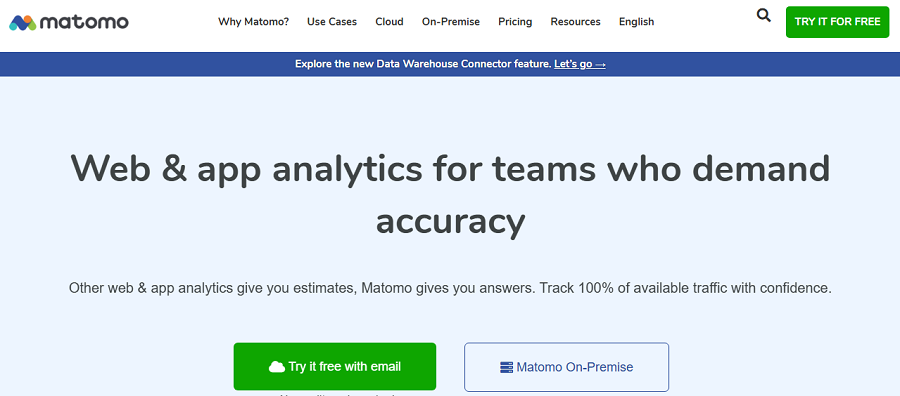
Matomo is a big name in the realm of privacy-centric tools. It offers enterprise-grade analytics features while respecting user privacy.
It’s one of the most feature-rich GA4 alternatives, and that’s why over 500,000 websites are currently using it.
The only drawback is that its dashboard might be a bit difficult to set up for beginners. However, it’s great for organizations and experts that need full control over their data.
Look at its features to get familiar with its power:
- Cookie and cookie-less tracking
- Heatmaps, session recording
- A/B testing, funnels, and goals
- Ecommerce tracking
- Self-hosted or cloud-hosted
- GDPR-compliant with consent tools
| Pros | Cons |
| ✅ Full-featured Google Analytics alternative ✅ Data ownership and privacy controls ✅ Consent management and legal compliance tools | ❌ Complex UI and learning curve ❌ Can slow down performance ❌ Advanced features require paid plugins ❌ Overkill for simple use cases |
Conclusion: What Privacy-Focused Tool Is Suitable for Your Business?
Privacy-focused analytics tools are the future of web tracking. No matter what type of website you’re running, you’ll need a reliable analytics tool that respects your visitors’ privacy while offering detailed, accurate monitoring features to you.
Choosing the right tool depends on your needs, the scale of your website, and your budget.
The following table compares the top privacy-first analytics tools to help you choose the best one for your website:
| Feature/Tool | WP Statistics | Plausible | Fathom | Simple Analytics | Umami | Matomo |
|---|---|---|---|---|---|---|
| Cookie-free | ✅ Yes | ✅ Yes | ✅ Yes | ✅ Yes | ✅ Yes | ✅ Optional |
| Open-source | ✅ Yes | ✅ Yes | ❌ No | ❌ No | ✅ Yes | ✅ Yes |
| Self-hosting | ✅ Yes | ✅ Optional | ❌ No | ❌ No | ✅ Yes | ✅ Optional |
| Ease of Use | ⭐⭐⭐⭐⭐ | ⭐⭐⭐⭐☆ | ⭐⭐⭐⭐☆ | ⭐⭐⭐⭐☆ | ⭐⭐⭐☆☆ | ⭐⭐☆☆☆ |
| Real-time Data | ✅ Yes | ✅ Yes | ✅ Yes | ✅ Yes | ✅ Yes | ✅ Yes |
| Event Tracking | ✅ Basic (via add-ons) | ✅ Basic | ✅ Basic | ✅ Custom Events | ✅ Custom Events | ✅ Advanced |
| Ad Block Bypass | ✅ Yes | ❌ No | ✅ Yes (custom domain) | ❌ No | ❌ No | ❌ No |
| Free Plan | ✅ Free + Paid Add-ons | ✅ Up to 10K views | ❌ Paid only | ✅ Limited | ✅ Fully free | ✅ Free |
As you can see, WP Statistics is exceptional among other tools. It offers a user-friendly dashboard on your WordPress panel with almost everything you can expect from an analytics tool.
This plugin gives you insights into your traffic, author performance, top-performing keywords and pages, and also good customization for IP anonymization and cookie-less tracking.
The good news is that you can have many of these features for free. Moreover, it offers some advanced add-ons like live tracking and marketing analysis for an affordable price.
So why wait? Go privacy-focused right now!
FAQs
Is analytics without cookies effective?
Yes! Thanks to privacy-focused analytics tools, you can track essential metrics of your website without using cookies.
What are the best GDPR-compliant analytics tools?
WP Statistics, Matomo, and Fathom are the best cookieless tracking solutions that comply with GDPR by default.
What’s a HIPAA-compliant analytics tool?
HIPAA is a regulation regarding data protection in the healthcare industry. Websites and businesses in this industry should comply with these regulations to ensure the privacy of patients.
Can I track my website without leaving the WordPress dashboard?
Yes! Plugins like WP Statistics are effective Google Analytics alternatives that can be directly used on your WordPress dashboard.

